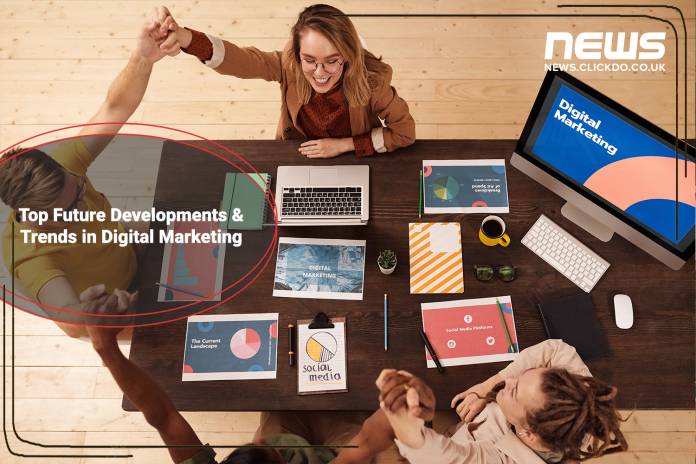The environment of digital marketing is one thing you can always bank on: it’s dynamic and ever-changing. In the rapidly changing world of digital marketing, flexibility is not merely a benefit, but also a requirement.
Standing on the cusp of a new era, business owners can see how technology advancements, shifting customer preferences, and creative approaches will define the future of digital marketing. Many are examining the major elements that will reshape the field of digital marketing in the coming years in this examination of developing trends.
A lot of companies have already started to prepare their digital marketing strategies for 2024 and beyond. Astute companies search for the newest trends to implement to optimize their outcomes and influence.
Keep reading to discover top digital marketing trends that can help your business succeed and beat the competition.
1. Integration of Machine Learning (ML) and Artificial Intelligence (AI)
Digital marketing is about to undergo a revolution thanks to AI and machine learning. Large volumes of data are analyzed by AI-powered algorithms, which produce insights that help marketers and businesses the likes of online casino games make better decisions.
Through chatbots that provide real-time support and personalized recommendations, AI and ML are improving consumer experiences and optimizing marketing procedures. Businesses that use these technologies will have a competitive advantage in comprehending and interacting with their target consumers as they develop further.
2. Dominance of Videos
In digital and omnichannel marketing, video content has dominated the landscape, and this tendency is only going to get stronger. Because short-form videos are generated which are so popular on sites like TikTok and Instagram Reels. And so, marketers should concentrate on making engaging and viral video content.
3. Optimization of Voice Search
Voice search is becoming more and more common as virtual assistants like Siri, Alexa, and Google Assistant gain popularity. As more people use voice-activated devices to explore the internet, content optimization for voice search becomes increasingly important. To guarantee that their content is found through voice search, marketers will need to modify their SEO strategy to account for long-tail keywords, local optimization, and natural language inquiries.
4. Interactive Content Marketing

The world of traditional content marketing is changing to become more participatory and interesting. Polls, quizzes, and augmented reality experiences are examples of interactive content that draws viewers in and promotes participation. This trend improves user engagement while also giving marketers useful information to adjust their plans according to user preferences and behaviours.
5. Customization on a Large Scale
While personalization has long been a marketing cliché, recent technological developments have made it feasible to accomplish customization on a large scale. To provide recommendations and personalized information, AI algorithms examine user behaviour, preferences, and historical interactions. Companies that can personalize their messaging to each customer will establish closer bonds and encourage repeat business.
6. Using Blockchain in Marketing

Blockchain technology is causing waves in marketing as well, not just in cryptocurrency. Blockchain is useful for digital advertising because it guarantees security and transparency in transactions. It deals with problems like ad fraud, making sure that advertisers receive what they pay for and that their advertisements are seen by the target market. As concerns about data privacy and ad fraud continue to grow, blockchain has the potential to revolutionize the digital advertising environment.
7. Inclusive Marketing
Diversity and inclusivity are now required in marketing; they are no longer optional. Brands that accurately represent a wide variety of voices and opinions are attracting more and more attention from consumers. Beyond only including representation in ads, inclusive marketing also entails producing inclusive content, giving back to charitable organizations, and encouraging a feeling of community across a range of audience demographics.
Summing it Up
Digital marketing’s future is a dynamic field that is being affected by societal changes, customer behaviour, and technological advancements. Businesses hoping to remain relevant and competitive will need to embrace these new trends.
Marketers need to be flexible and creative to engage their consumers in meaningful ways, given the increasing prevalence of interactive content, the integration of AI and ML, and the need for diversity. Businesses may successfully navigate the always-changing landscape of digital marketing and set themselves up for future success by remaining knowledgeable and adaptable.
































